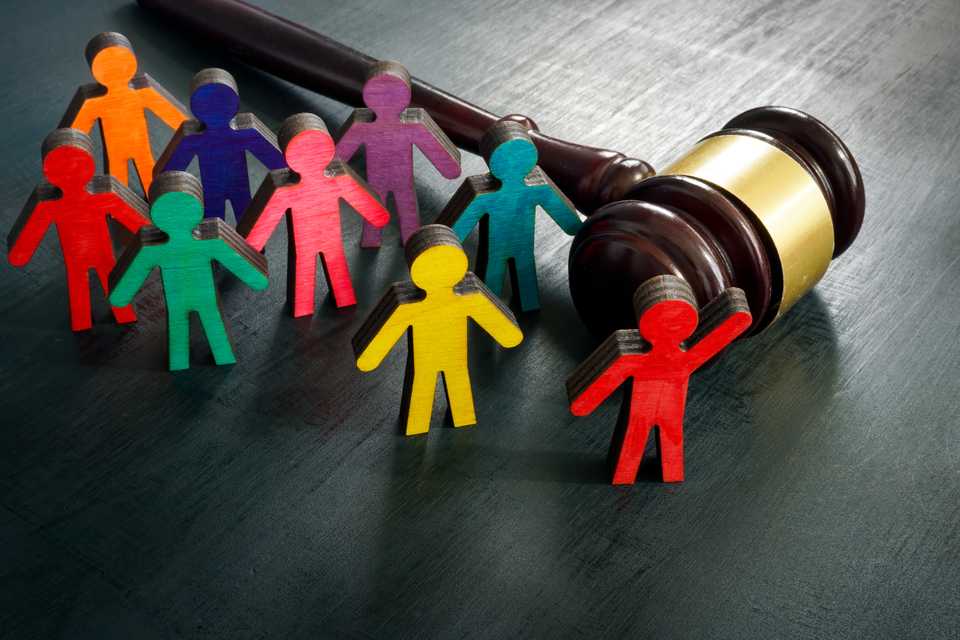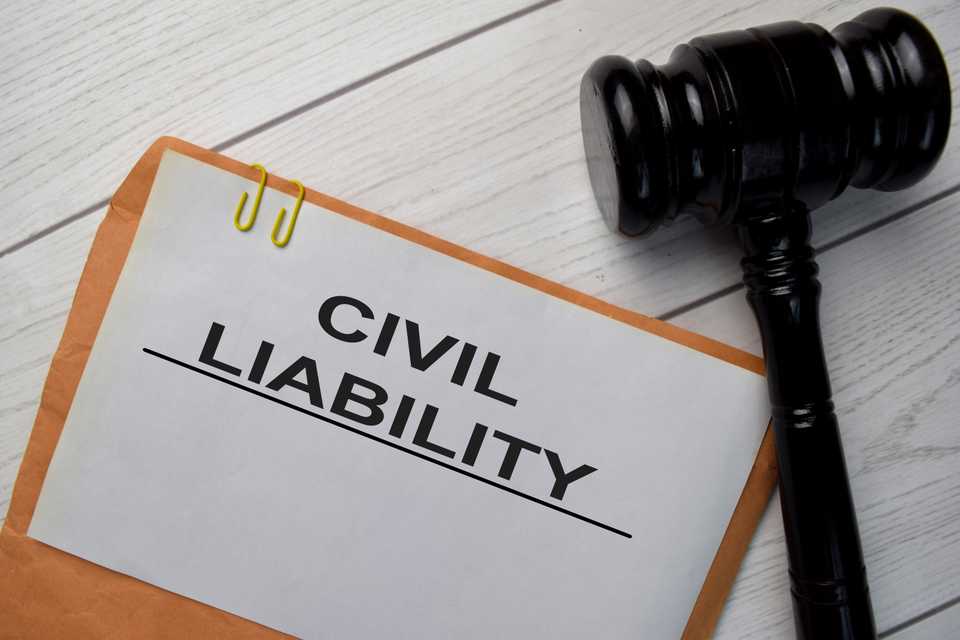When someone suffers damages caused by the fault of a third party, it is normally possible to seek financial compensation to remediate the situation and put the victim back in their situation before the accident.

If someone files a civil liability claim against you, the compensation you might be forced to pay can be quite impressive. However, before reaching that point, the victim will have to demonstrate that you are responsible for the damages.
However, contrary to what many people think, such a situation is not black or white. Indeed, your fault might not be the only cause for the damages. In such a situation, you might not have to pay the full price.
There are other situations where it is possible to limit your civil liability. Nonetheless, specific rules will apply, and you might have to respect numerous conditions for the limits to apply to your situation.
Civil Liability: What Is It?
Before understanding the limits of civil liability, the first step is to clearly understand how this obligation applies to everybody. Indeed, in Quebec, every individual has the responsibility to not cause harm to someone else.
Hence, if a victim seeks compensation for damages they suffered, they will have the burden to demonstrate the existence of the 3 mandatory conditions, namely the fault, the damages and the causal link between both of them.
1) The Fault
The first condition is to establish that the defendant committed a fault. This notion includes acts but also omissions. Generally, to determine the existence of a fault, the judge will answer this question: Would a reasonably prudent and diligent person in that same circumstances have acted in the same way?
If the answer is no, a fault will have been committed. Therefore, the first condition for civil liability will be met. Of course, the fault must be committed by someone gifted with reason. For instance, if a 2-year-old kid causes damages, it will not be possible to file a claim against him. However, his parents could be responsible.
2) The Damages
Even if the defendant caused a fault, compensation will only be awarded if you can demonstrate that the “fault” resulted in damages that you suffered. Indeed, it is imperative that you suffer real damage.
According to the jurisprudence in Quebec, there are three different types of damages that a victim can demonstrate in order to receive compensation.
| Damages | Examples |
|---|---|
| Material | Loss of salary, damage to property… |
| Physical | Injuries, aesthetic damages… |
| Moral | Stress and anxiety… |
With that condition, it will be necessary to evaluate the damages the victim suffered. Although this is particularly easy for material damages, the task can be complicated for other types of damages.
Find a lawyer who will help you evaluate the damages suffered by filling up JuriGo’s form today!
3) The Causal Link
The last condition will be to demonstrate the causal link between the fault of the defendant and the damages you suffered. After all, if you want the defendant to compensate you for the damages, he must be the one responsible.

As the defendant, it is often a time when you will demonstrate that you are not the sole responsible for the damages suffered. For instance, if the victims also acted in an imprudent way, this could lower your responsibility and thus, the compensation you will have to pay.
Limitation Clause – Is It Possible to Exclude Responsibility?
It is possible that you came across a clause in a contract stipulating that the business is not responsible for any damages or losses caused by any situation. This type of clause is a limitation of liability.
For instance, finding such a clause at a ski station could be possible where they indicate that they are not liable. Whether it is on a poster, a ticket or a receipt, the ultimate goal is to exclude liability in the event you suffer damages while using their products or their services.
In other words, even if you wanted to file a claim to receive compensation, such a clause would make the legal proceedings useless as the defendant could argue that he is simply not liable for the damages.
Does that clause always work? In short, no. It is likely that the liability clause is simply not valid. This is true even if it is visible in the contract and if the words used are clear. Here are the limits of this clause in Quebec.
Contract Between Individuals
Firstly, if you signed a contract with another individual, such a clause could only apply in specific situations. The most important thing to know is that it will be valid only for damages on goods.
Furthermore, to exclude liability for damaged goods with a clause, it will be necessary to respect some conditions:
- The other party was aware that the clause limiting liability existed,
- The clause was clearly written and both parties understood what it meant, and
- The party agreed to receive the service or to use the product while knowing the existence of the clause.
Even if the liability clause respects the three conditions, it will not apply if the person caused damages intentionally or through carelessness. The clause won’t apply in cases of gross negligence or imprudence.

What happens with personal damages? Even in a contract between individuals, a clause limiting liability will not apply. In other words, it will be possible to sue the person who caused you psychological or physical injuries.
File a claim as soon as possible with the help of a lawyer specialising in civil liability. All you need to do is to fill up JuriGo’s form and we will take care of the rest for you!
Contract Between a Consumer and a Merchant
Secondly, if you are a consumer and the contract you signed involves a merchant, you have a higher level of protection. Indeed, you will be automatically covered by the Consumer Protection Act.
Hence, the law strictly prohibits a merchant from excluding their liability with the help of a clause in the contract. Therefore, even if you see this clause, you should not have to worry about it as it is simply not valid.
For instance, if you employed a moving company and it damaged your furniture in the process, a clause excluding its liability would be void and thus, you could file a claim to seek compensation.
Civil Liability Insurance: How Does It Work?
You might have heard about civil liability insurance without knowing exactly how it works. However, it plays a key role in protecting yourself if you cause involuntary damage to someone else.
In Quebec, every individual or business has the obligation to civil liability, meaning that you will have to respect the rules and avoid causing harm to others. This obligation is covered by Article 1457 of the Civil Code.
| Article 1457. Every person has a duty to abide by the rules of conduct incumbent on him, according to the circumstances, usage or law, so as not to cause injury to another.Where he is endowed with reason and fails in this duty, he is liable for any injury he causes to another by such fault and is bound to make reparation for the injury, whether it be bodily, moral or material in nature.He is also bound, in certain cases, to make reparation for injury caused to another by the act, omission or fault of another person or by the act of things in his custody. |
|---|
If someone fails to respect this obligation, the victim will be able to seek compensation in front of a court. If the defendant does not want to pay directly, it is possible to subscribe to a civil liability insurance before the claim.
How does it work? The insurance will not only cover material damages but also any other damages caused by an accidental situation. With this insurance, you will be protected from important financial consequences if you are found guilty of civil liability.
What Is Covered by The Civil Liability Insurance?
Generally, civil liability insurance covers material damages as well as physical damages resulting from negligence from the insured. It will also cover damages that are caused by the goods it owns.
| Did you know? In most cases, it is possible that your housing insurance already includes civil liability insurance. Before subscribing, make sure to verify that you are not already protected. |
|---|
For instance, your insurance would cover damages that were caused by your car while you were driving it. However, in that case, it is important to know that physical damages are automatically covered by the SAAQ, regardless of your liability.
The civil liability insurance will normally cover different aspects. Regardless of the monetary limit that will be included in your insurance contract, it will notably cover:
- The cost of your defence (lawyer fees and other judicial costs), and
- If you are liable, the victim’s compensation.
Depending on the insurance you subscribed to, you will be able to identify the charges covered. For instance, you might be covered in cases of civil liability as well as professional and general.
| Liability | Explanation |
|---|---|
| Personal | Concerns the damages that you could cause to someone else in your daily life |
| Professional | Concerns the damages that you could cause in the conduct of your professional activities. For instance, a dentist that breaks a client’s teeth. |
If you have a civil liability insurance within your home insurance, it will not only cover situations that occur on your property. Therefore, if you push a grocery cart on someone else's car by accident, it will normally be covered.
What Are the Limits of Civil Liability Insurance?
However, even if your insurance covers a broad range of accidents, there are some situations where your insurance will not cover you. Depending on your contract, it is possible that the insurer specified exclusions within the insurance. Generally speaking, here are the most frequent exclusions:
- Damages caused voluntarily by the insured,
- Illegal activities,
- Damages caused under the influence of drugs or alcohol, or
- Claim exceeding the monetary limit.
Furthermore, this insurance only covers damages caused to third parties. Therefore, you will not be able to seek compensation for damages you caused to yourself or a member of your family.

Lastly, if you make a false declaration to your insurer at the signature of the contract, it is possible that your insurance could be cancelled. In that case, if your insurer can demonstrate that you acted in bad faith, it is also possible for it to not defend you in court. In that case, you will have the responsibility to pay the damages awarded to the other party.
Prepare Your Defense with The Help of A Lawyer Partnered With JuriGo!
Facing civil liability claims can be particularly difficult. Indeed, the financial claims can be quite high, and you might not feel like you are entirely responsible for the damages suffered by the victims.
As mentioned, there are ways to limit your liability in certain circumstances before the accident occurs. However, once it happens, you will not have the possibility to subscribe to insurance or to make the person sign a civil liability limitation clause.
Nonetheless, this does not mean that you will have to be fully liable for the entirety of the damages. With the right defence, you will be able to prove that you are not responsible or that the victim also contributed to the situation.
The right defence starts with the right lawyer. By having a lawyer specialising in civil liability, you will put all the chances on your side to avoid paying the full amount and limit your liability.
Don’t wait any longer and fill out the form today to find the right lawyer for your defense!